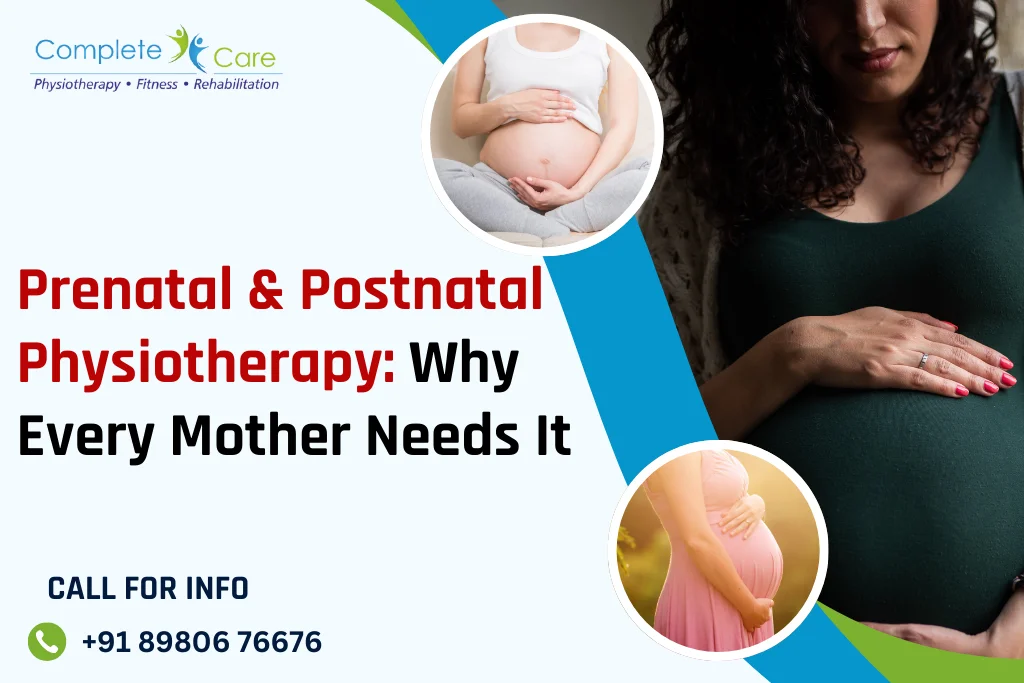Motherhood is a most memorable time for every woman filled with joy, excitement, and many physical changes. During and after pregnancy a woman’s body has various transformations. Physiotherapy plays a major role for pregnant women by ensuring her healthy pregnancy and safe physical recovery. Physiotherapy treatment can help pregnant women by managing her body pain and improving mobility as well.
Lets discuss the importance of physiotherapy in pregnancy and after childbirth.
Physiotherapy in Pregnancy
Here are some key benefits:
- Pain Relief: Many pregnant women experience back pain, pelvic pain, and joint discomfort due to the growing baby and shifting center of gravity. Physiotherapists use safe exercises and manual therapy techniques to alleviate pain and discomfort.
- Improved Posture: As pregnancy progresses, the spine curves to accommodate the baby’s weight, leading to poor posture. Physiotherapy helps correct posture, reducing strain on the lower back and pelvis.
- Strengthening Pelvic Floor Muscles: A strong pelvic floor supports the uterus, bladder, and bowels, reducing the risk of incontinence during and after pregnancy. Physiotherapy includes pelvic floor exercises that improve muscle control and prevent complications like prolapse.
- Preparation for Labor and Delivery: Labor requires endurance, flexibility, and proper breathing techniques. Physiotherapists guide expectant mothers through exercises that enhance flexibility and stamina, making childbirth smoother and less painful.
- Reduced Risk of Pregnancy Complications: Regular physiotherapy can help manage conditions like gestational diabetes, hypertension, and swelling by promoting better blood circulation and mobility.
Postnatal Physiotherapy: Essential for Recovery
Postpartum recovery is just as important as pregnancy care. After childbirth, many women face muscle weakness, back pain, and postural imbalances. In this situation, Postnatal physiotherapy helps new mothers regain strength and recover faster.
- Restoring Core Strength: After delivery, the abdominal muscles, especially the rectus abdominis, may become weak or separate (diastasis recti). Physiotherapy includes core-strengthening exercises to restore stability and prevent long-term issues.
- Pelvic Floor Rehabilitation: Postpartum pelvic floor weakness can lead to urinary incontinence and discomfort. Physiotherapists provide targeted exercises to strengthen these muscles, improving bladder control and overall well-being.
- Relief from Back and Neck Pain: Caring for a newborn involves frequent bending, lifting, and breastfeeding, which can cause back and neck pain. Physiotherapy helps improve posture and relieve muscular tension through manual therapy and stretching techniques.
- Scar Tissue Management (C-Section Recovery): Women who undergo a C-section may experience scar tissue tightness and pain. Physiotherapists use manual therapy to improve tissue mobility and prevent adhesions.
- Emotional and Physical Well-Being: Physiotherapy not only supports physical recovery but also helps in reducing postpartum anxiety and depression. Gentle exercises and relaxation techniques promote overall mental wellness.
Finding the Best Physiotherapy Center for Maternal Care
Complete Care is a Physiotherapy center who specialises in Maternal Care and Chiropractic Adjustment. It also offers Cupping Therapy, Spine-Neuro Rehabilitation, Class IV Laser Therapy, and Non-Surgical Spine Decompression Therapy.
With experienced team members they provide personalized care to the new mothers, ensuring comfort, pain relief, and overall well-being throughout their journey.
Here are some factors to consider:
- Experienced Physiotherapists: Look for specialists trained in women’s health physiotherapy.
- Personalized Treatment Plans: Each pregnancy and postpartum journey is unique, requiring customized care.
- Safe and Comfortable Environment: The clinic should provide a welcoming space with the latest physiotherapy techniques.
- Comprehensive Services: A good physiotherapy center offers treatments for pain relief, pelvic health, postural corrections, and postnatal rehabilitation.
Conclusion
Pregnancy and postpartum recovery can be challenging, but physiotherapy for pregnant women provides the support needed for a smooth journey. From pain management to strengthening the pelvic floor, physiotherapy in pregnancy ensures a healthier, more comfortable experience. Postnatal physiotherapy helps mothers recover efficiently, regain strength, and prevent long-term complications.
To ensure the best care, find the best physiotherapy center that specializes in maternal health and supports both prenatal and postnatal well-being. A healthy mother leads to a happy baby, making physiotherapy an essential part of motherhood.




